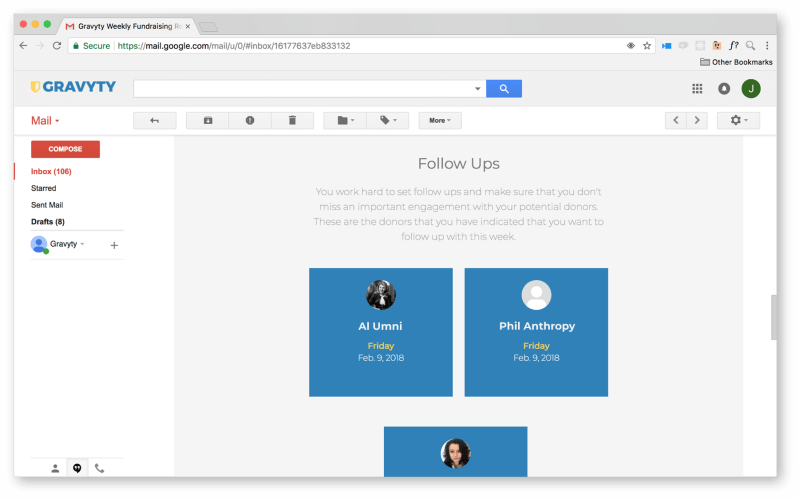Watch all the Transform 2020 sessions on-demand here.
Nonprofit organizations send an average of three email newsletters and two donation appeals monthly, and for every 1,000 emails sent to subscribers, they raise an average of only $42. To help bolster their efforts, Adam Martel and Rich Palmer founded Gravyty in 2016. The Newton, Massachusetts-based startup leverages AI and machine learning to help nonprofits reach their fundraising goals. In a vote of confidence, K1 Investment Management this week announced a $21 million investment that brings Gravyty’s total raised to date to roughly $23 million.
“I’m excited for this next step in Gravyty’s journey as we expand the use of artificial intelligence to solve the world’s biggest challenges through philanthropy,” said Martel. “As the first company focused solely on building AI tools to empower fundraising operations, Gravyty has unlocked efficiencies and results that are orders of magnitude beyond what was previously possible. K1 has unparalleled experience in assisting innovative software companies such as ours scale through its operational support, and we couldn’t be more excited to partner with their team to make AI accessible to all nonprofit organizations.”
Gravyty’s platform automatically composes email drafts for users to send to donors at the optimal time, and it provides a weekly action plan — Gravyty Guide — that prescribes personalized outreach, stewardship, and follow-up actions. Campaign admins and managers receive regular travel recommendations based on the locations of their top donors, and Gravyty connects them with leaders who aren’t in traditional fundraising roles (such as deans, board members, pastors, department heads, program managers, athletic directors, and provosts) to move donations forward while taking their donation history and other information into account.

June 5th: The AI Audit in NYC
Join us next week in NYC to engage with top executive leaders, delving into strategies for auditing AI models to ensure fairness, optimal performance, and ethical compliance across diverse organizations. Secure your attendance for this exclusive invite-only event.
On the subject of emails, Gravyty’s algorithms can learn writing tones and styles and identify top donor prospects automatically. The Guide provides a roadmap — who to call or meet with to solicit a gift, who to steward, who to follow up with, and so on — as does Go, which algorithmically suggests the best cities and regions to travel to. (It will soon recommend meeting places based on donor location and top reviews.) As for Stewardship, it taps anomaly detection to compare donors’ current gifts with prior donations and suggest appropriate messaging. Connect, which integrates with popular custom relationship management platforms from Salesforce, Blackbaud, and others, promises to match campaign operators with the right donors at the right time.
Martel says the robustness of Gravyty’s product helped it nab a number of heavy-hitting customers, including thousands of fundraisers at University of Delaware, DePaul University, Northern Kentucky University, Iona College, Providence College, Dallas Symphony Orchestra, Oberlin College, University at Buffalo, the Pittsburgh Foundation, College of Charleston, the George Washington University, and Cure Alzheimer’s Fund.
“Higher education is going to change more in the next 10 years than it has in the past 100,” said Westmont College vice president for college advancement and chief information officer Reed Sheard. “I believe this means that our sector’s best days lie ahead as we learn to leverage disruptive technologies. Gravyty is already transforming how fundraising can work by leveraging artificial intelligence and machine learning, and those results allow us to fund student success, leading research, and more at Westmont College.”


